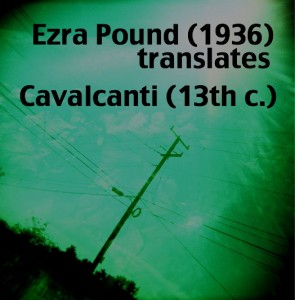Ever since I was an undergraduate at UMBC, I have been awestruck by the impossibility of such things as translating poetry. It cannot truly be done without re-creating the poem into a new form, because of the obvious limits of word-for-word translation.
I spent my final year at UMBC studying Guido Cavalcanti’s poems in translation, doing my best to argue that Ezra Pound was the best translator, to date, of Cavalcanti’s courtly love sonnets.
Unless you are an Italian lit aficionado or English major, you’ve no doubt never heard of Guido Cavalcanti.
You have, I’m sure, heard of a guy named Dante, and his Divine Comedy?
Had there been no Cavalcanti, there would arguably be no Dante. He was both a forerunner and a mentor to Dante.
Even better, Guido and Dante were besties, together part of the dolce still novo (“the sweet new style”) of troubadour-tinged poets in 13th century Italy. This was one influential bunch.
Cavalcanti and Dante, in particular, played an incredibly crucial role as poets in helping to develop what has become of the Italian language today.
I expect to introduce you more to both Cavalcanti on this blog, but for now, I’ll give you a taste of Ezra Pound’s poetic translation theory (“the double current”), as well as how he approached the expansive emotions of Cavalcanti in one of his sonnets.
I, for one, have historically used Cavalcanti to help brush up on my Italian…I’m not fluent, but hope to be, one day.
++++++++++++++++++++++++++++++++++++++++++++++++++++++++++++++++++++++++++++
From Translations, Ezra Pound (1953)
“These are no sonnets for an idle hour. It is only when the emotions illumine the perceptive powers that we see the reality. It is in the light born of this double current that we look upon the face of the mystery unveiled.” ~Ezra Pound
Sonnet XVIII (trans. Ezra Pound)
Beauty of woman, of the knowing heart,
And courtly knights in bright accoutrement
And loving speeches and the small birds’ art,
Adorned swift ships which on high seas are sent,
And airs grown calm when white the dawn appeareth
And white snow falling where no wind is bent,
Brook-marge and mead where every flower flareth,
And gold and silver and azure and ornament:
Effective ‘gainst all these think ye the fairness
And valour of my Lady’s lordly daring?
Yea, she makes all seem base vain gathering,
And she were known above whome’er you’d bring
As much as heaven is past earth’s comparing;
Good seeketh out its like with some address.
+++++++++++++++++++++++++++++
Sonetto XVIII (Cavalcanti’s original)
Bilta di donna, e di saccente core,
e cavalieri armati che sien genti,
cantar d’augelli e ragionar d’amore,
adorni legni ’n mar forte correnti,
aria serena quand’ appar l’albore,
e bianca neve scender senza venti,
rivera d’acqua e prato d’ogni fiore,
oro e argento, azzurro ’n ornamenti,
cio passa la beltate e la valenza
de la mia donna e’l su’ gentil coraggio,
si che rassembra vile a chi cio guarda.
E tant’ a piu d’ogn’altra canoscenza,
quanto lo cielo de la terra e maggio:
A simil di natura ben non tarda.
[Holga image by Tamiro]
